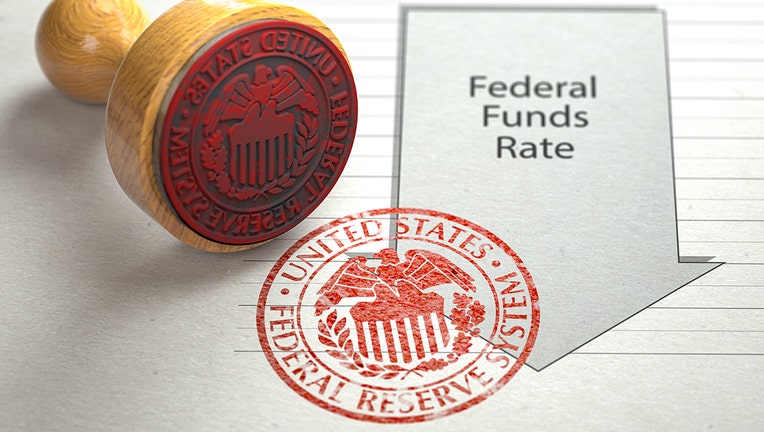The Federal Reserve’s effect on student loans: What to know

Student loan interest rates could decline if the Fed lowers rates again. (iStock)
The Federal Reserve kept short-term interest rates at nearly zero in 2020 in a response to the coronavirus pandemic and to help stimulate the economy. The low interest rates were intended to help Americans who were struggling because they lost their jobs.
The Federal Reserve generally influences short-term rates. However, the interest rates on both consumer loans and student loans are driven more by levels of long-term rates rather than short-term rates, according to Robert Johnson, a finance professor at Creighton University's Heider College of Business in Omaha, Nebraska.
How the Federal Reserve impacts student loan rates
Private student loans offer variable and fixed interest rates. The variable rates change based on the Fed rate, the amount of money banks pay each other to borrow money overnight. When the Fed decides to lower rates, variable rate loans will also decline.
Refinancing can be a good strategy specifically for private loan borrowers. Those with federal student loans have access to benefits such as income-based repayment plans and forbearance and deferment options. However, private student loans do not offer any of those, just the ability to refinance at a potentially lower rate. And refinancing your federal student loans into private ones would mean those benefits would be lost permanently.
"Borrowers who have older private student loans with high balances and higher interest rates may find an opportunity for savings with a drop in the Fed rate," said Bruce McClary, spokesperson for the National Foundation for Credit Counseling, a Washington, D.C.-based non-profit organization.
During the week of April 12, rates on 10-year fixed-rate loans averaged 3.78% for borrowers who had at least a 720 credit score and used the Credible marketplace. Rates on 5-year variable-rate loans averaged 3.26%.
Private loan borrowers can take advantage of the low interest rate environment to refinance their education debt. The interest rate you're offered when you refinance can depend on factors like your FICO score, the type of loan you’re seeking (fixed or variable rate) and the loan repayment term.
An online tool like Credible can be handy for comparing student loan refinancing rates from multiple lenders without affecting your credit score.
HAVE $100,000 IN STUDENT DEBT? 5 WAYS TO HELP PAY IT OFF
How to factor in the Fed if you want to refinance student loans
For people thinking about refinancing, consider waiting for the rate decrease if you're opting for a fixed-rate loan, said Leslie Tayne, a Melville, N.Y. attorney specializing in debt relief.
"If you refinance now, you're essentially locking in the interest rate for the life of the loan," she said. "If you wait and the rate drops, you would be able to take advantage of locking in that lower rate."
The timing isn't as important for borrowers that are refinancing with a variable rate loan.
"If the Fed decides to slash rates again, the loan's interest rate will automatically decrease," Tayne said. "On the flip side, interest rates will increase if the Federal Reserve decides to increase its rate again."
HOW HAS THE BIDEN ADMINISTRATION HELPED STUDENT LOAN BORROWERS?
Why would the Fed cut rates?
The Fed could lower rates again if there is a "black swan" event that upsets the financial markets, such as if a variant of Covid-19 emerges and is resistant to the vaccines, and would precipitate a full or partial shutdown of the economy, McClary said. If the Fed did cut rates, short-term interest rates would fall again to help stimulate the economy.
For anyone looking to take out a new student loan, it's important to know that federal student loans have fixed interest rates. Another interest rate cut would benefit borrowers seeking to take out a federal student loan or a variable-rate private student loan.
You can visit Credible to learn more about private student loan options and get personalized rates from multiple lenders without dinging your credit score.
4 CREDIT UNIONS TO CONSIDER WHEN REFINANCING STUDENT LOANS
Final thoughts
Refinancing your private student loans could help you save thousands of dollars in interest and allow you to pay your loans off sooner.
One reason to refinance a private loan is that the interest rates are low right now compared to recent years and this could help someone save thousands of dollars, McClary said. Borrowers taking advantage of federal student loan payment relief might consider refinancing their private loans to take the pressure off their budget when administrative forbearance ends.
If you're looking to refinance, you should consider using Credible to compare student loan refinancing rates from multiple lenders at once without affecting your credit score. You can also use an online student loan refinancing calculator to get a sense of what your new monthly payments could be.
PART OF A FORBEARANCE OR DEFERMENT PROGRAM? HERE'S WHAT TO LOOK FOR ON YOUR CREDIT REPORT
Have a finance-related question, but don't know who to ask? Email The Credible Money Expert at moneyexpert@credible.com and your question might be answered by Credible in our Money Expert column.

